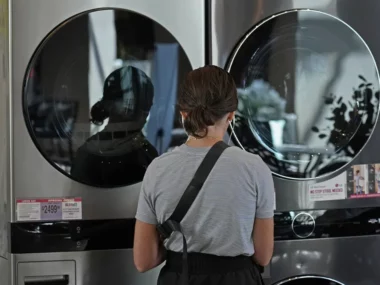A significant number of Americans frequently worry about not being able to make ends meet. According to a recent CNN poll, nearly four in ten (39%) US adults are concerned most or all of the time that their family’s income won’t cover expenses. This is an increase from 28% in December 2021 and is comparable to the 37% during the Great Recession.
To manage, many Americans are taking on side jobs, reducing their driving, and using credit cards more. The poll also reveals that 52% of Latino and 46% of Black Americans worry most or all of the time about covering expenses. Additionally, over half (55%) of those earning less than $50,000 a year share this concern.
These results highlight that despite low unemployment and cooling inflation on a national level, many Americans are struggling due to years of rising prices. Angela Russell, a program analyst at the CDC from Ohio, mentioned that grocery and other prices, including clothing and insurance, have surged. To save money, she recently moved from a rental home in Cincinnati to a cheaper rural area.
Two-thirds of Americans (65%) identified expenses and the cost of living as the biggest economic challenge for their family today, down from 75% in summer 2022 but higher than 43% in summer 2021. Moody’s Analytics reports that the average household now spends $925 more each month to buy the same goods and services as three years ago.
Russell summed it up, stating, “The pressure is real. Everything is so much more expensive than it was four years ago. It’s astronomical what you’re paying.”
Inflation may have decreased, but prices have not.
The inflation rate has significantly decreased, with consumer prices rising by 3% year-over-year in July, according to the Bureau of Labor Statistics. This is a substantial drop from the 9% peak in June 2022 when gas prices exceeded $5 per gallon.
However, many Americans aren’t experiencing much relief. Prices remain higher than last year, though their increase has slowed. Consumers are still grappling with the price surges of 2022 and 2023.
Greg McBride, chief financial analyst at Bankrate, explained, “We can discuss how inflation is moderating, but the cumulative effect of several years of inflation has severely impacted household budgets. While the big picture shows low unemployment, economic growth, and spending, the ground reality is that moderating inflation doesn’t mean prices are decreasing, just that they’re not rising as quickly.”
On the positive side, paychecks have increased over the past three years, recently outpacing price rises. Median household incomes are now $1,110 higher than three years ago, surpassing the additional $925 people are spending on the same goods and services, according to Moody’s Analytics.
Side hustles and spending less
However, not everyone is experiencing an increase in income.
“Many have seen their purchasing power diminish. Even if your income has matched the rise in prices, you’re just staying afloat,” said McBride.
To manage, many are seeking additional income sources.
The CNN poll found that 35% of adults have recently taken on extra work to make ends meet. This number is even higher among Latinos (52%), Black Americans (44%), and those under 45 (47%).
Due to the current economic climate, most Americans have had to reduce spending on extras and entertainment (69%) and adjust their grocery purchases (68%). Additionally, 41% have cut back on driving, and 37% are using credit card debt to cover necessities. While the percentage of Americans reducing driving has decreased from 54% in spring 2022, the proportion cutting discretionary spending and adjusting grocery budgets has remained relatively constant over the past two years.
Angela Russell, who works at the CDC, noted that her pay depends on the federal budget and doesn’t include the bonuses or stock options that others in different industries receive. “Everything seems to be outpacing my earnings,” she said.
To focus on essentials, Russell has canceled most of her streaming services, goes to the movies less often, and buys candy from Walmart instead of at the theater. She’s also shifted from buying books and magazines to borrowing from the library.
“I’ve had to cut back on all the fun things I enjoy. I used to visit the bookstore or buy magazines. Now, I get books from the library,” she said.
The CNN poll, conducted by SSRS from June 3-24 before President Joe Biden dropped out of the 2024 presidential race on July 21, surveyed a random national sample of 2,021 adults initially contacted by mail and 407 adults reached through random digit dialing to a sample of prepaid cellphone numbers. The surveys were conducted either online or by telephone with a live interviewer. The margin of sampling error for the full sample is plus or minus 2.7 percentage points and is larger for subgroups.











